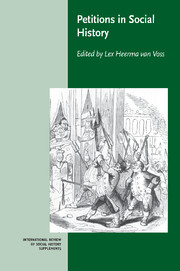Book contents
- Frontmatter
- Contents
- NOTES ON CONTRIBUTORS
- Introduction
- Voices from Among the “Silent Masses”: Humble Petitions and Social Conflicts in Early Modern Central Europe
- Supplications between Politics and Justice: The Northern and Central Italian States in the Early Modern Age
- The Power of Petitions: Women and the New Hampshire Provincial Government, 1695–1700
- Officially Solicited Petitions: The Cahiers de Doléances as a Historical Source
- Revolt, Testimony, Petition: Artisanal Protests in Colonial Andhra
- Deference and Defiance: The Changing Nature of Petitioning in British Naval Dockyards
- Petitions and the Social Context of Political Mobilization in the Revolution of 1848/49: A Microhistorical Actor-Centered Network Analysis
- The Image of Jews in Byelorussia: Petitions as a Source for Popular Consciousness in the Early Twentieth Century
- “Begging the Sages of the Party-State”: Citizenship and Government in Transition in Nationalist China, 1927–1937
- Private Matters: Family and Race and the Post-World-War-II Translation of “American”
Voices from Among the “Silent Masses”: Humble Petitions and Social Conflicts in Early Modern Central Europe
Published online by Cambridge University Press: 04 August 2010
- Frontmatter
- Contents
- NOTES ON CONTRIBUTORS
- Introduction
- Voices from Among the “Silent Masses”: Humble Petitions and Social Conflicts in Early Modern Central Europe
- Supplications between Politics and Justice: The Northern and Central Italian States in the Early Modern Age
- The Power of Petitions: Women and the New Hampshire Provincial Government, 1695–1700
- Officially Solicited Petitions: The Cahiers de Doléances as a Historical Source
- Revolt, Testimony, Petition: Artisanal Protests in Colonial Andhra
- Deference and Defiance: The Changing Nature of Petitioning in British Naval Dockyards
- Petitions and the Social Context of Political Mobilization in the Revolution of 1848/49: A Microhistorical Actor-Centered Network Analysis
- The Image of Jews in Byelorussia: Petitions as a Source for Popular Consciousness in the Early Twentieth Century
- “Begging the Sages of the Party-State”: Citizenship and Government in Transition in Nationalist China, 1927–1937
- Private Matters: Family and Race and the Post-World-War-II Translation of “American”
Summary
Social historians have quite frequently referred to the “silent masses” in history. They have thereby hinted at the problem that most preserved documents derive from a tiny elite. The great majority of the people, being illiterate, only very rarely left private letters, diaries, autobiographies and testaments, or official acts, charters, statistics, and reports. Besides the source problem, this view reflected concerns of structuralism and Marxism, both very fashionable among social historians up to the 1970s, who related the masses' interests to socioeconomic conditions. Ordinary people thus appeared rather as objects of economic structures than as subjects of historical processes. Though some German-speaking social historians integrated the anthropological category of “experience” into their studies in the 1980s, they assumed that ordinary people had interests in, and experiences of, but still no influence on historical processes. Merely local and reactive early modern social protest thus remained historically unimportant – in sharp contrast to the nineteenth-century working class movement. During the 1990s, studies of social conflict focused on the concept of agency and discussed the influence historical actors had on processes such as modernization.
In order to study ordinary people as historical actors, petitions provide considerable qualitative and quantitative advantages. Petitions, grievances, and supplications, Gravamina, Suppliken, and Beschwerden, doléances, requêtes, and représentations, gravami, petizioni, and querele, clamores, greuges and griefs – or whatever they have been called in changing times and regions – were produced by individuals or groups, regardless of their age, status, class, ethnicity, religion, or sex.
- Type
- Chapter
- Information
- Petitions in Social History , pp. 11 - 34Publisher: Cambridge University PressPrint publication year: 2002
- 5
- Cited by



